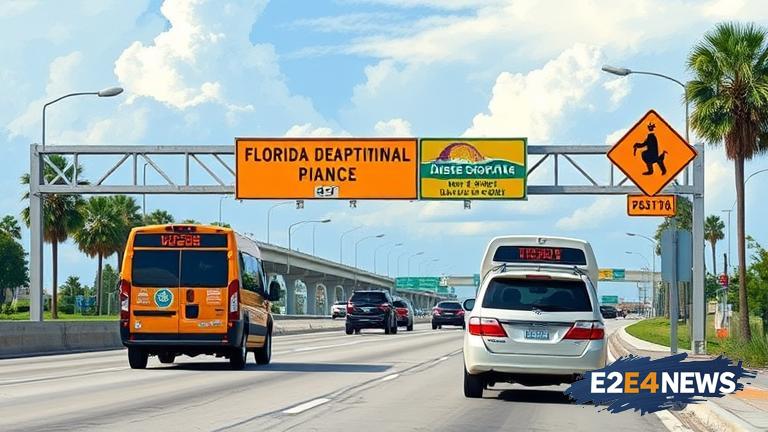The Florida Department of Transportation (FDOT) has been facing intense scrutiny in recent weeks over its expenditure of funds. Many have raised questions about the department’s spending habits, with some arguing that the allocation of funds for various projects is not being done in a transparent or efficient manner. The FDOT is responsible for overseeing the construction and maintenance of the state’s transportation infrastructure, including roads, highways, and bridges. However, with a budget of over $10 billion, many are calling for greater accountability and oversight. One of the main concerns is the use of consultants and contractors, with some arguing that the department is relying too heavily on outside firms rather than using in-house staff. This has led to accusations of wasteful spending and a lack of transparency in the contracting process. Furthermore, there have been allegations of cronyism and favoritism in the awarding of contracts, with some firms receiving lucrative deals without having to go through a competitive bidding process. The FDOT has also been criticized for its handling of major projects, such as the construction of new highways and bridges. Many have argued that the department is not doing enough to ensure that these projects are completed on time and within budget. In addition, there have been concerns raised about the environmental impact of some of these projects, with some arguing that the FDOT is not doing enough to mitigate the effects of construction on local ecosystems. The department has also been accused of not doing enough to address the state’s growing traffic congestion problem, with many arguing that more needs to be done to improve public transportation and reduce reliance on personal vehicles. Despite these criticisms, the FDOT has argued that it is doing its best to manage the state’s transportation infrastructure with the resources available to it. The department has pointed to a number of successes, including the completion of several major projects and the implementation of new technologies to improve traffic flow. However, many remain skeptical, and there are calls for greater oversight and accountability. The state legislature has announced plans to conduct an audit of the FDOT’s finances, which is expected to shed more light on the department’s spending habits. In the meantime, the FDOT has announced plans to implement new measures to improve transparency and accountability, including the creation of a new office of inspector general. The department has also pledged to do more to engage with the public and stakeholders, including holding regular town hall meetings and conducting surveys to gauge public opinion. As the debate over the FDOT’s spending habits continues, one thing is clear: the department faces a number of significant challenges in the coming years, from managing the state’s growing population to addressing the impacts of climate change. To meet these challenges, the FDOT will need to be more transparent, accountable, and efficient in its use of funds. The department will also need to work more closely with stakeholders, including local communities and the private sector, to ensure that the state’s transportation infrastructure is meeting the needs of all users. Ultimately, the success of the FDOT will depend on its ability to balance competing priorities and make tough decisions about how to allocate its resources. By doing so, the department can help to ensure that the state’s transportation infrastructure is safe, efficient, and sustainable for generations to come. The FDOT’s budget is set to increase in the coming years, with a focus on investing in new technologies and infrastructure. The department has also announced plans to hire more staff, including engineers and planners, to help oversee the construction of new projects. As the FDOT moves forward, it will be important for the department to prioritize transparency and accountability, including by providing regular updates on its spending habits and progress towards its goals. By doing so, the FDOT can help to build trust with the public and stakeholders, and ensure that the state’s transportation infrastructure is meeting the needs of all users.
